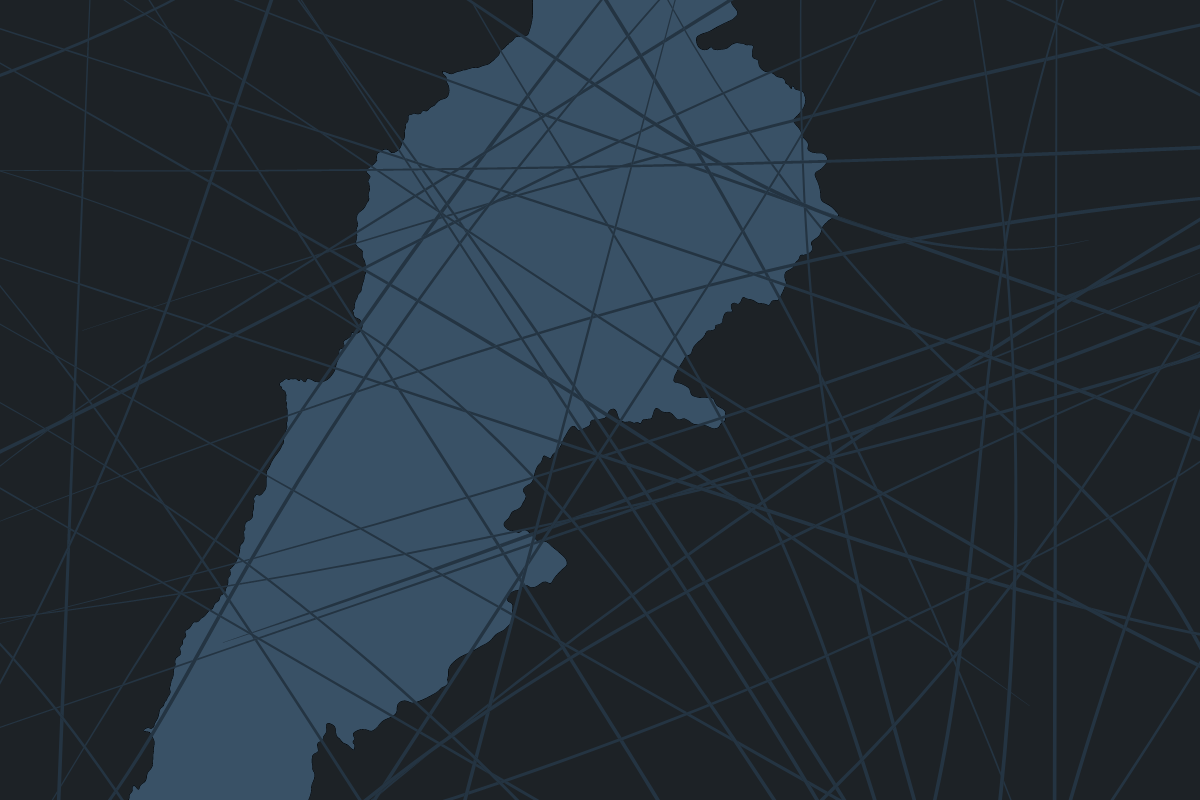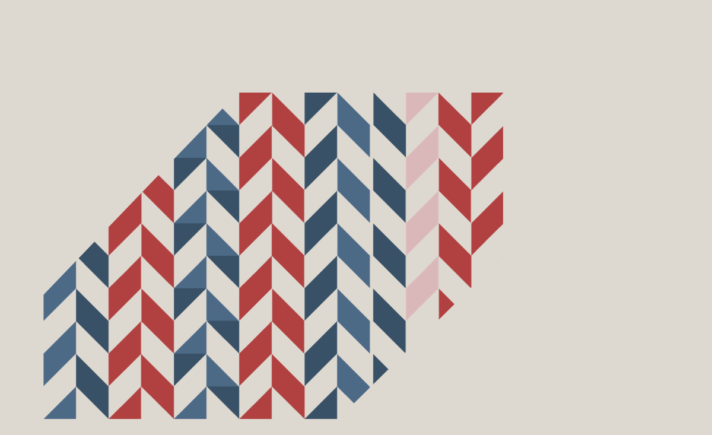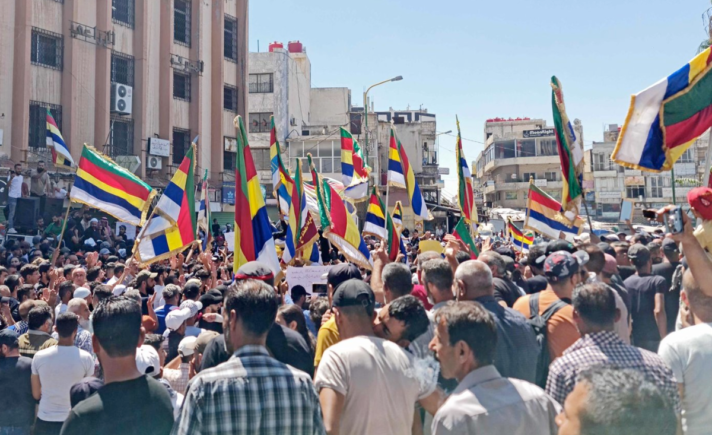A climate of racism and scapegoating towards Syrian refugees in Lebanon is reaching a fever pitch. The last three months have seen a huge rise in deportations and raids against Syrians. To anyone living in Lebanon in 2023, this was not surprising. What was less predictable, however, was the creation of a nationalist citizens’ movement to help expel Syrian refugees from the country.
“The greatest danger Lebanon has witnessed since its creation”
On 20th April, Maroun al-Khawly made an address to a press conference in Jal el Dib where he announced the creation of “the National Campaign to Liberate Lebanon from the Syrian Demographic Occupation.” In his address, he called Syrian refugees’ continued presence “the greatest danger Lebanon has witnessed since its creation,” and called for the forced return of all “irregular” Syrians. (The transcript was published in full on the website of the Lebanese Ministry of Media.)
Two days later, the movement posted a notice on Lebanon Files and Hadath Online calling for a protest in front of the UNHCR Office in Beirut, “in order to combat the insolence of this occupier” (meaning Syrian refugees), but the protest was swiftly prevented by the Minister of the Interior Bassam Mawlawi in a directive sent to General Security forbidding all protests that day.
The “National Campaign”
Al-Khawly, the president of the General Federation of Lebanese Trade Unions, describes the “Campaign” as a citizens’ movement made up of people from all walks of life (although their official facebook page lists the group as a “politician”.)
A recent video released by the group (which drew online ridicule for using Shutterstock images to represent Lebanese people) makes their case clear. “I am a victim of the poverty that you caused my country,” it reads. “I am a victim of the food that you’re eating from my plate. I am a victim of the education that you are receiving instead of my children. I am a victim of the water that you are drinking from my spring.” With the hashtag #أنا_لبناني (“I am Lebanese”), it puts forward the return of displaced Syrians as the solution to Lebanon’s crises. “The solution to the electricity I have a right to,” it reads, repeating the same claim about medicine, education, land, housing, petrol, water, jobs, healthcare and bread.
Their key tenets are clear. They see the refugee crisis as a deliberate Syrian attempt to control Lebanon; they support forced deportation instead of “voluntary return”; and they identify humanitarian aid organisations in Lebanon as the tools of a conspiracy contrived in Brussels to, as al-Khawly puts it, “put an end to Syrian refugees crawling to the European continent” by keeping them in Lebanon.
It demands from the Lebanese government the immediate forced return of one million Syrians and the creation of a diplomatic council to seek compensation from the EU for “what Lebanon has lost.”
“Your enemy and my enemy are one!”
The movement’s name, clearly chosen to evoke feelings of trauma that many Lebanese still carry from the Syrian regime’s occupation of Lebanon, aims to equate refugees with the Assad regime’s military occupation. The irony of “liberating Lebanon” by cooperating with the very regime that occupied it is apparently lost on them.
That irony is not lost on Sami, a Syrian refugee who fled the war and has been living in Lebanon since 2013.
“The Syrian army was here in Lebanon for 30 years, so some Lebanese people really hate the Syrians because of the acts of the Syrian army. But as a Syrian, I escaped from the same army! Your enemy and my enemy are one!” Sami exclaims. “The Syrians here in Lebanon, they have no army, they have no weapons. They are not fighting. They are just trying to live.”
“The Syrians are affecting the general culture and the country,” he concedes. “But we can’t say it’s a demographic change because the Syrians… They are not here forever. No Syrian wants to stay here in Lebanon – no one. If someone right now told me that I could leave this country for another safe country right now, I would go like this. I wouldn’t need to change my clothes,” he says with a laugh.
Sami, whose name has been changed for his safety, is from the city of Al-Qusayr, the rebel stronghold which fell to Syrian regime forces and Hezbollah in 2013 in an assault that destroyed much of the city. When the opposition fled the city, Sami fled with them.
“I witnessed 20 to 30 days of heavy fighting during the war. Aeroplanes, guns, mortars… a lot of weapons. When the opposition decided to escape, I had to escape,” he explains. “I was protected by the opposition, but I don’t fight – I have problems with guns. I fight with my pen.”
Al-Qusayr is particularly targeted by the regime. Anyone wishing to return to their homes there must apply for approval, with a 60% success rate. Sami’s brother-in-law was detained and beaten by regime forces simply for being from Al-Qusayr. But his hometown is only one of his concerns about returning to Syria.
“Just thinking about going back to Syria is like risking my life. Firstly, if I do military service, I might be moved somewhere that will get me killed. Secondly, because I have an opinion about the regime, I might get imprisoned. And thirdly, just because I’m from Al-Qusayr, I might get detained or killed.”
Since fleeing Syria, Sami has worked throughout Lebanon as a construction worker, before settling in Zahle in 2017. Having entered Lebanon as a refugee (and therefore illegally), his employment opportunities are limited to construction work, agriculture and waitering. Anything else is prohibited to Syrians without residency papers. Property ownership is also prohibited. Even Sami’s car had to be registered in the name of a Lebanese person for him to be able to drive it.
“Whenever I see an army officer or police, I have to change my route,” he says. “If I need to go somewhere, I need to make sure there is no army on the way, no checkpoints.” This state of constant panic is what many Syrians in Lebanon are forced to live in. “You feel like you are always at risk. You are afraid. If you hear any voices from a vehicle, you need to make sure that’s not the army, because maybe they’re coming for you.”
Media coverage of human rights abuses has somewhat improved recently, but Syrians have faced abuse for years now. The government and municipalities routinely discriminate between their Lebanese and Syrian residents (for example, with stricter quarantines on Syrians during the Covid pandemic).
In 2015, Sami was on a visit to General Security to try to secure residency papers. When he presented his documents and ID, the officer grabbed the ID and started to slowly bend it until it snapped in half, and then said, “Go to Masnaa. This ID isn’t valid.” Masnaa is the main border crossing to Syria. When Sami protested, the officer simply shouted at him until he left.
“That soldier broke my ID card to forbid me from getting residency. And back in Syria, if you have a broken ID card, you are clearly with the opposition. If any Syrian soldiers saw my broken ID, they would arrest me.” But in order to get an ID replacement, he would have to return to Syria in person.
The lack of any valid ID has left Sami unable to apply for residency papers or to return safely to Syria. The following year, on his way to work at a construction site, he came across some soldiers who asked him for his residency papers and ID. Not having any, he was arrested and taken to Riyaq Military Base.
“I was in jail for two days, and moved around three or four branches of security agencies,” he explains, eventually ending up at General Security. “I don’t need to tell you that I got kicked and beaten a lot of times, and that they abused me verbally, physically, psychologically… After that they gave me a piece of paper that said I had to leave Lebanese land within five days.”
Sami still has this piece of paper, which he keeps along with his broken ID card. For seven years he has successfully avoided the Lebanese Army. Despite all of this he remains optimistic and refuses to tar all Lebanese with the same brush.
“A lot of Lebanese people are very good people, friendly,” he says. “I have a lot of Lebanese friends. Not all of them are good, not all of them are bad. Like the Syrian people – not all Syrians are criminals and not all of them are angels.”
Separating politics from human rights
There has been a clear increase in arrests and deportations of Syrians in recent months. Arbitrary detention, torture and forced eviction are rife.
According to a report by ACHR, between the beginning of April and mid-May the Lebanese army has carried out 22 raids on refugees’ residences, and authorities have arbitrarily arrested 808 refugees (including 17 of which hold legal residency permits, and 25 children), some of whom endured violence and inhumane treatment by army officers. At least 336 of the detained were then forcibly deported (12 of which held legal residency permits). Of those deported to Syria, many were arrested on arrival and transferred for military service, and at least 35 were handed over to the dreaded Fourth Division, the dreaded elite formation of the Syrian Army commanded by Maher al-Assad.
As Lebanon threatens to teeter over into fascism, many Syrians have become too afraid to leave their homes.
Movements like the “National Campaign” may be frightening, but Fadel Fakih, the Executive Director of CLDH, sees them as a symptom of a growing climate of hostility rather than the threat itself.
“We should always take these campaigns seriously,” he says. “However, currently, it’s not a threat. What Syrian refugees are more afraid of are the security authorities and being deported and handed over to a criminal regime.”
CLDH (the Lebanese Center for Human Rights) is a Beirut-based non-profit organisation which works on the rehabilitation of victims of torture and providing pro bono legal aid to migrants of all nationalities. I ask Fadel what we are seeing in Lebanon today.
“There are a lot of multi-layered crises that have made the country reach this point, and corruption cannot be separated from what happened,” he explains. “And like any other country in the world, political actors will try to scapegoat some people. For Lebanon, who was easier to blame than the refugees?”
“Unfortunately, this is what happens when we don’t separate politics from human rights,” Fadel adds.
I ask him about the reports of informal raids on camps and the recent increase in deportations. He tells me something surprising.
“In an informal talk, a top official in the Lebanese Army said that they were given this mandate on April 23rd 2019, in a decision by the Higher Defence Council,” he explains. “And, it’s now that people are seeing them act, but they were doing it before. But what we used to see was that the army transferred people to General Security, who would deport people. But now the army is deporting people and putting people directly on the borders.
“In 2011, when Syrian refugees started to come in, the government did not step in and implement a plan to deal with this crisis. We saw how other countries trained them for the job market. But Lebanon is not a productive economic region. So we tried to ignore it and went for the easiest way, which is trying to get aid from the international community. We did not use it to our advantage.”
But the narrative that the refugees caused Lebanon’s economic collapse is very persistent, as is the claim that all Syrian refugees receive financial support from the UN in cash dollars. In reality, only 11% of refugees in Lebanon are funded by UNHCR (according to their own figures), and only 43% of the lowest-income Syrian refugees receive financial aid. These amounts are limited to 2.5 million LBP per family, which are paid in Lebanese pounds. (The decision by UNHCR last week to begin paying aid in USD has at the time of writing not yet taken effect.)
The most pernicious narrative of all is that Syria is now safe to return to, and given Syria’s recent return to the Arab League, it has become far easier for Lebanon to cooperate with the Assad regime to forcibly return refugees. A favourite for the presidential election, Sleiman Frangieh, openly admitted in an interview with Al Jadeed on April 26 that he has the trust of Bashar al-Assad, saying “this guy, there’s friendship between me and him.”
All these narratives found their way into the speech of Maroun al-Khawly, where he also cited false statistics. He claims, for example, that half of Lebanon’s residents are Syrians, but according to UNHCR’s latest figures (published in January) there are 1.5 million Syrian refugees, 814,715 of which are registered (as of Dec 2022). His claim that the Syrian birth rate exceeds 200,000 yearly is unverifiable, since the last reliable statistic is from 2016 (when around 40,000 Syrian babies were born). In the absence of any reliable monitoring, claims about the numbers of Syrian refugees have become a free-for-all.
Organisations like CLDH contend with these kinds of false narratives and manipulated statistics constantly.
“The numbers which say that there are a lot of Syrians in the prisons, that 80% of the crimes are being committed by Syrians,” Fadel elaborates, “we know these are not true because what is considered a crime is illegal entry to the state. And [since they are refugees], most of the cases are like that.”
Despite Lebanon’s legal obligation to non-refoulement, the principle of international law which forbids returning refugees to any country where they would be in danger, legal avenues are increasingly ignored by the Lebanese state, and judicial authorities are often absent from the whole process.
“The Universal Declaration of Human Rights is quite clear on Article 14, the right to asylum. Also, we ratified the Convention Against Torture in the year of 2000, and Article 3 is quite clear that you are not allowed to deport a person that would be at a risk of unfair treatment or torture in their country.”
Nevertheless, the situation is not hopeless. Fadel maintains hope that some change can be enacted by international pressure.
“What we are also trying to do is to leverage the assistance and aid that is being provided to security authorities or other governmental institutions,” he explains, “We’re seeing that happening now with a multi-state donor project, led by USAID and implemented by UNDP, which provided assistance to the Army and to the ISF. We noticed that State Security and General Security were excluded, perhaps due to their human rights records. It’s important to see this pressure.”
“Do not surrender”
How Lebanon deals with this continuing crisis will define its politics and international relations for years to come. Time will tell what will come of the “National Campaign”, but in the meantime millions of lives hang in the balance, struggling to survive in an ever more hostile country.
I ask Fadel what advice he gives to Syrians who contact CLDH for help.
“Try to function in solidarity. If you know a person who gets arrested and is in need of assistance, try to get someone to help them. We have 16 lawyers and we try to provide this support.”
“It’s very important that you know what your rights are in this country, and how you are protected. Secondly, know that you always have access to legal assistance, and you should always make use of that. Do not surrender. Fight for your rights.”





